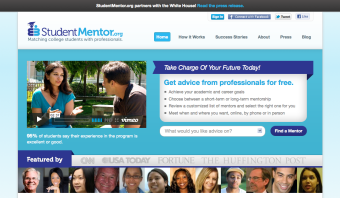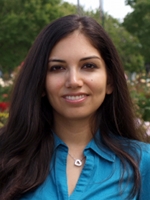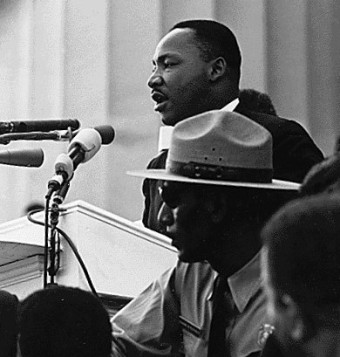Starting A Company As A Medical Student: An Interview With Stephanie Bravo
 Having A Good Mentor Can Make A Big Difference
Having A Good Mentor Can Make A Big Difference
It has been said that you are the average of the five people you spend the most time around. If that is true, the formula is simple; find people that are doing what you want to do and tag along. Unfortunatly, it's not always this simple; however, StudentMentor.org is changing that. This company is dedicated to helping college students find mentors to help them along their journey. They are working with students from over 700 colleges in the the United States. They are currently partnering with the White House on several national education initiatives. It's an impressive operation!
 So how did this whole thing get started? I caught up with Stephanie Bravo who is Co-founder of studentmentor.org. At the time, she was a medical student at University of California Irvine School Of Medicine. She is currently President of the company and works full time with the organization and has alot of good advice for medical students.
So how did this whole thing get started? I caught up with Stephanie Bravo who is Co-founder of studentmentor.org. At the time, she was a medical student at University of California Irvine School Of Medicine. She is currently President of the company and works full time with the organization and has alot of good advice for medical students.
How did you decide to start StudentMentor.org?
I decided to start StudentMentor.org after having a life-changing experience with a mentor during my years as an undergraduate. I was a first-generation college student who felt completely lost at a large public university and was unsure about my future. But then I found my mentor through the Stanford University Minority Medical Alliance Medical Mentorship Program, and this experience changed my life. My mentor, Dr. Matthew Goldstein (http://www.studentmentor.org/about-us/advisory-board/#goldstein), was a medical student at Stanford University School of Medicine, and he provided so much guidance throughout my studies, especially during those challenging times when completing college and attaining a career as a physician seemed out of reach. Even more than that, we got to talking about life, family, and a variety of other things where he provided tremendous support for me at times when I had no one else to help me. Because of my life-changing experience, I wanted to help other students connect with mentors who could help them at crucial stages in their academic and career pursuits. Thus, StudentMentor.org was born to help students complete college and enhance their career readiness by connecting them with seasoned professionals from a wide variety of backgrounds and industries.
What where some of the challenges/perks of starting a company while in medical school?
There were not enough hours in the day for me to be a well-balanced person, succeed in medical school, and lead an organization. It was very difficult to maintain my course load and go through the process of creating something from scratch. I had to rely on my StudentMentor.org co-founder and friends in medical school to help me juggle. Shifting between these roles was tough, but both required a great deal of tenacity and a strong work ethic. With those in tow, I pursued both medicine and my startup nonprofit for a while. I managed to survive by being very diligent, disciplined, and organized. But, because I was incredibly passionate about StudentMentor.org and the broader issue of higher education, I decided to fully commit to leading my organization and put becoming a physician on the backburner. I know I made the right decision when we received a call from the White House inviting us to meet the President and speak with officials about StudentMentor.org in December 2011. Additionally, after one year, 5000+ mentors and students from all around the nation are connecting and beginning meaningful mentorships. It’s very exciting to be at the helm of an organization that is soaring to great heights at a record pace.
How can medical students and residents get involved as a mentor and what is the time commitment that a mentor makes?
The time commitment for mentors varies depending on their availability. You can communicate with mentees at any time convenient for you. We recommend that mentors set aside about 30 minutes a week to mentor one student. Since professionals come from a variety of industries and backgrounds, it’s very flexible to their schedules. Medical students all the way up to attending physicians can serve as mentors. We even have resident physicians in the program who somehow find time to help their mentees. I hope that those UncommonStudentMDs will consider joining StudentMentor.org too.
You have become an expert at helping people find mentors. Can you give some advice on how to find and approach a mentor?
The best way to reach out to potential mentors is to ask them if they have time to grab coffee. If you speak candidly about looking forward to hearing their experiences and learning from them, then a potential mentor will be receptive. It’s not a good idea to lead with what you want to get out of the relationship, e.g. a letter of reference, the contact information for their colleague, etc. Like with any relationship, you have to put in the time to build trust, and that starts with putting yourself out there by telling your story, sharing your goals, and realizing that a mentor’s insight is extremely important in helping you achieve your goals.
Do you have any advice for medical students who would like to start a business?
Taking time off from school might be the best move since building a business is a huge time commitment—kind of like medical school, but without a 4-year plan or any other roadmap. That being said, I’ve had amazing classmates at UC Irvine School of Medicine who have written and published novels, created student organizations, and ran underserved clinics while still maintaining a full course load—so it is possible!
Another, big tip is to reach out for help and persuade people to your cause. If you can build a movement that your classmates are passionate about as well, then you’ll have 100+ medical students in your corner to help get your business off the ground. It’s very important to build and utilize your networks in any business, including medicine.
Why did you want studentmentor.org to be a non-profit instead of a for profit company?
There are pros and cons to both entities. In a for-profit entity, the bottom line would always rule and not necessarily doing the most good for the cause. We decided to become a nonprofit to keep the monies accrued by the organization focused toward achieving its goals. Additionally, it was a lot easier to recruit mentors who are all volunteers.
If you could pick one book for every medical student to read what would it be?
I would recommend “The Empowered Patient” by Elizabeth Cohen, CNN Senior Medical Correspondent. It’s great to read books on the “white coat” reading list, but a holistic understanding of the medical profession comes from reading books written for patients as well. This book by Cohen offers patients insight into how patients should go about getting the best medical care possible. She argues for being a “bad patient” by asking questions and not blindingly doing what you are told until you understand what and why you need to do it. As future physicians, it’s absolutely critical to be able to communicate with patients. So, learning more about the patient's perspective and trying to meet them where they stand is a good start to becoming a great physician.
Video: Why I Started StudentMentor.org
Video: How StudentMentor.org Works


 1 Uncommon Comment
1 Uncommon Comment






"I wouldn't do it twice, but I would not 'not' do it once."
- ZDoggMD